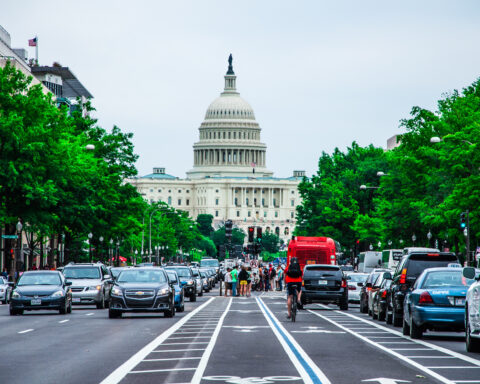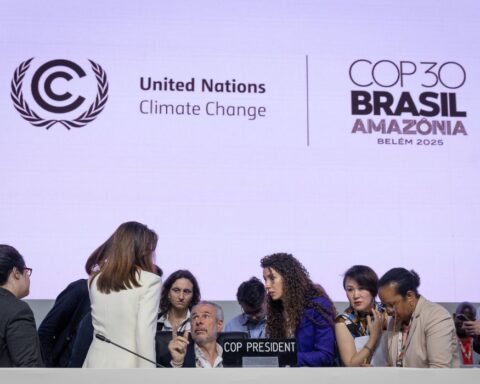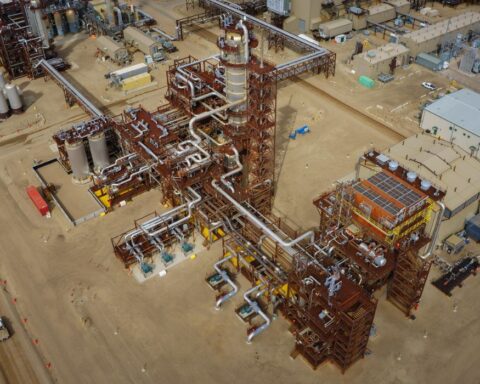It’s not you – it’s them.
That’s the main message behind a new campaign by Canadian advocacy group Environmental Defence that “names and shames” a cast of seven corporate individuals it says are most to blame for the lack of climate action on the fossil fuel front.
Abstract terms like “oil and gas sector” obfuscate responsibility. “We want to point fingers where fingers deserve to be pointed,” says Julia Levin, associate director of national climate at Environmental Defence. “It’s no accident that in Canada, climate policy after climate policy gets weakened, delayed or killed. It’s because of the actions of a small number of people who are putting their profits ahead of Canadians and the rest of the planet.”
Earlier this month, Environmental Defence launched its “Canada’s climate villains” campaign, using graphic-novelesque illustrations and monikers like “Toxic Traitor” and “Ruthless Greenwasher.” It’s a tactic that, Levin notes, is less common in “so-called polite Canadian society” – and is designed precisely to cut through the noise.
“We know that a backgrounder with all that information won’t get read,” she says.
The list of seven people includes Dave McKay, the head of RBC, the biggest oil and gas lender in the world (nearly $350 –billion since 2015, according to Environmental Defence) and the subject of a greenwashing investigation by the Competition Bureau of Canada; Susannah Pierce, the CEO of Shell Canada, who has been called out for greenwashing; and Brad Corson, the head of Imperial Oil, a subsidiary of Exxon Mobil. Imperial is currently under investigation by the federal government for a toxic leak from an oil sands mine in northern Alberta that leached industrial wastewater into muskeg, forest and waterways used by First Nations for nine months before the public was notified.
Rounding out the list are Michael Binnion, who heads up the Modern Miracle Network, an oil advocacy organization; Alex Pourbaix, whom Environmental Defence labels as “the big oil spin doctor” at the helm of Cenovus, one of the largest oil sands companies in the country; Arthur Irving, a billionaire who leads New Brunswick’s Irving Oil, the largest oil refinery in Canada; and Lisa Baiton, CEO of the Canadian Association of Petroleum Producers, the biggest Canadian oil sands lobby group which promotes the notion of “ethical oil.”
Canada has pledged to reach net-zero emissions by 2050, alongside 120 other countries. Last year, it committed to cut emissions by 40 to 45% below 2005 levels by 2030. It’s counting on the oil and gas sector – which represents 26% of all emissions in the country – to shave its emissions by 31% below 2005 levels by 2030 while at the same time forecasting oil production to rise by 22% between 2020 and 2030.
“We committed to the [oil and gas] sector that we would work with them in a collaborative basis to establish the cap,” Natural Resources Minister Jonathan Wilkinson said last March, ahead of public consultations on the matter.
But environmental activists have warned that the government’s numbers do not add up. Climate Action Tracker, a research group that follows the progress made by the countries that generate about 85% of global emissions, considers the climate policies Canada has drafted thus far to be “highly insufficient.” While it notes that emissions are “starting to trend downwards,” the government has yet to specify how exactly it will hit net-zero in the given time frame.
“Under all scenarios, Canada is still producing and exporting oil and gas in 2050,” Climate Action Tracker states.
Environmental Defence says it’s a mistake to believe that oil and gas companies can be part of a green transition. In Canada, as Corporate Knights has previously reported, they pay among the lowest average carbon costs of any sector. “It was British Petroleum that invented the idea of a carbon footprint in a really obvious effort to get people to focus on the small things that they can do – which are important but which are vastly outweighed by the impact of these individuals and their companies,” says Levin.
Environmental Defence’s campaign focuses on corporate actors, not politicians, “because we’re a charity and have to be non-partisan.” Beyond following the money trail and identifying the biggest players in the industry, it zeroed in on misinformation and a narrative fostered by some quarters that equates being anti-oil with being anti-Canada, using so-called astroturf groups that “pretend to be people-driven movements but are really funded by the fossil fuel industry” as tools to disseminate their message. Environmental Defence named Binnion, an Alberta accountant turned energy entrepreneur, as a key player in the “petro populism movement.” Once described by former Quebec premier Jean Charest as “the kind of person who moves the dial,” Binnion has fought tooth and nail against the carbon tax, branding it as a “green paradox” in a quest to bring down the Trudeau Liberals. The Modern Miracle Network funded New Brunswick Proud, a group affiliated with a conservative network that pushed out anti-Liberal and pro-oil messaging through memes and other social media content around the 2019 federal election.
Levin says the goal of the climate-villain campaign is to help people understand the ways in which the oil and gas sector operates, and the influence it wields, so that they can go back to their communities and “create more political space for ambitious climate action.”







